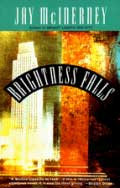 This book review was originally published in the Baltimore Evening Sun on June 21, 1993.
This book review was originally published in the Baltimore Evening Sun on June 21, 1993.
Although the era of American history known as the Reagan/Bush years only recently came to a close, Jay McInerney heard the bells tolling years ago. His novel Bright Lights, Big City predicted the end all the way back in 1984 simply by using the fundamental law of gravity: what goes up must come down. McInerney’s vision of the shallowness of success inspired an entire corpus of yuppie philosophers intent on exposing the dark side of Reagan-era prosperity.
McInerney’s new novel, Brightness Falls, details the fulfillment of Bright Lights‘ prophecy. The book revolves around the stock market crash of 1987, when American businesses suddenly found themselves suspended like cartoon characters in mid-air without ground to stand on. Within twenty-four hours, corporate empires had silently and irrevocably collapsed, taking hoards of enterprising young opportunists with them.
Brightness Falls centers around Russell and Corrine Calloway, two principled and socially conscious yuppies that find themselves meandering down the path of corporate warfare at just the wrong time. Russell has a promising position in the venerable publishing house of Corbin, Dern and Company, but gripes that he doesn’t have the flexibility he needs.
His solution is one that could only happen in the ’80s: he concocts a scheme for a hostile takeover of his bosses. Soon Russell is swinging with the Big Bad Boys on Wall Street, dining in chic Manhattan restaurants, and standing on top of the world just as it’s about to be turned upside-down.
The sudden shift in the Calloways’ lifestyle is more than Corrine can take. She quits her Wall Street job and stays at home trying to combat the demons of depression, loneliness, and anorexia.
If Brightness Falls has a moral, it’s that people pay more attention to style than substance. The fable about the emperor’s new clothes continually reappears throughout the novel in several permutations. Sometimes the “new clothes” are drugs and alcohol; usually, they’re simply the fads and fashions of the time. Brightness Falls is a novel about hot air, about the gossip and glitter used to repackage the same old ideas that never worked in the first place.
The Calloways’ story is only the thread that ties everything together. McInerney has woven several subplots in the background that show that this shallowness is a universal trait. Black publishing agent Washington Lee calculates the anti-racism protest against his company for its business potential, not its moral value. Legendary novelist Victor Propp lives off the advances on his second novel for twenty years, despite the fact that nobody’s even sure that he’s writing one. Writer Jeff Pierce chooses the road of drug addiction and decadence to avoid the problems of success.
What pushes McInerney’s novel over the rest of the jaded Reagan-era critics is a dynamic prose style that draws more from contemporary film than anything else. McInerney’s writing comes directly from the ear and the eye, which gives the book visceral impact without a lot of lengthy cerebral detours. Brightness Falls is also crammed full of snappy metaphors that keep the action going without degenerating into pomposity.
By the book’s end, it seems that McInerney has finally come to terms with the Me Decade. One can only hope that he will find enough material to keep us entertained through the Clinton-era ’90s.
0 thoughts on “Jay McInerney’s “Brightness Falls””